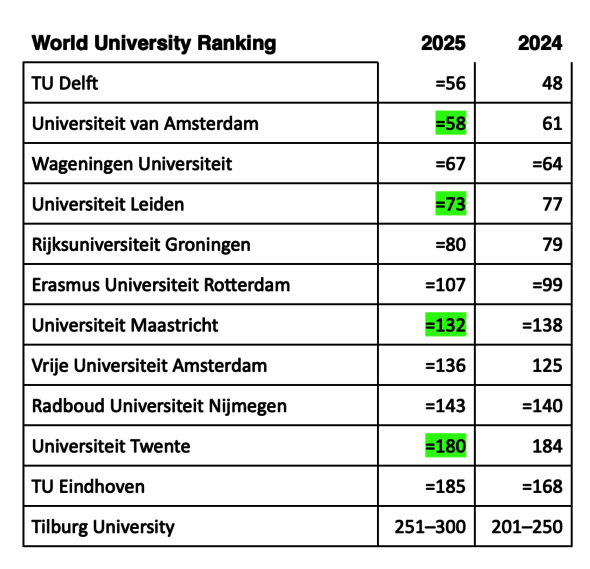TU/e drops 17 spots in Times ranking
Eight of the twelve Dutch universities in the world rankings of the British magazine Times Higher Education have finished lower than last year. The TU/e dropped seventeen places in one year, going from 168 last year, to 185 now. More and more questions are being raised about ranking universities in this way.
With major budget cuts looming, universities are under severe pressure, the composers of the British ranking predict, but the Netherlands still has eleven universities in the top 200.
There would be twelve if Utrecht University had not decided to stop cooperating with such rankings last year. The university is taking consequences after the criticism of such lists and no longer provides data. The idea is that you cannot actually reduce the performance of universities to one number.
TU/e will continue to participate
According to the TU/e spokesperson, the university is aware of this discussion, but for now, they do not intend to stop participating in rankings in general. “We are aware of the limitations of rankings and their methodology, but they are still important elements in the orientation of international students, who are an important part of our enrolment. We will therefore continue to participate in some of the most well-known rankings for the time being,” the spokesperson said.
Dropped
Last year, seven of the twelve remaining Dutch universities had dropped in ranking, and now there are eight. Only the universities of Amsterdam (UvA), Leiden, Maastricht and Twente finished higher on the list this time. Whereas the TU/e moved up from outside the top 200 last year to a good 168th spot, this year it dropped seventeen places again. However, the did TU/e manage to keep its top 200 spot.
With eleven universities in the top 200, the Netherlands is still doing very well. Only the United States (55), the United Kingdom (25), Germany (20) and mainland China (13) are scoring better.
British and American universities still dominate at the top of the ranking. The University of Oxford ended in first place for the ninth year in a row, followed this time by the U.S. Massachusetts Institute of Technology and Harvard again in third place.
“Voluntary”
The absence of Utrecht University raises the question of whether this top 200 provides an accurate picture. The Shanghai Ranking, for example, for which universities do not submit data voluntarily, does include Utrecht.
It's a good thing if universities can participate voluntarily, responds Phil Baty, THE's chief global affairs officer. “We are the only voluntary ranking. We respect Utrecht University's decision, but we are open to dialogue - and of course we would love to welcome the university back next year, so the Netherlands is more fairly represented in this important research project.”
More participants
The trend is actually the other way around, he says. More and more institutions are participating. There are nearly 2,100 universities this time from 115 different countries. Last year there were around 1,900 universities from 108 countries.
“All participants see the great benefits,” Baty argues. After all, they become visible on the world stage and can carefully compare themselves with other institutions. The ranking also provides insight into global developments and shows which new universities are excelling. In doing so, he says, the list also encourages international cooperation.



Discussion